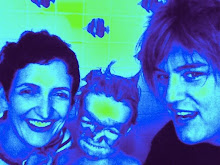A while back, I attended a workshop for LGBT families. At lunch, the organizers asked parents to break into small groups and talk about "things that sustain us." My group was chewing its sandwiches in awkward silence, so I decided to plunge in: for me, one of the most sanity-preserving practices has been staying connected to my queer communities.
"You do that?" asked a gay dad in his late thirties. "How do you do that?"
His incredulity got me thinking. Chosen family and subcultural networks are two of the great blessings of being queer. For many LGBT folk, our queer communities have sustained us through better and worse, richer and poorer, sickness and health. So why is it that, after they have kids, so many people end up missing from the potluck and the film festival, the protest and the dance floor?
Is it exhaustion? Fear? Finances? Some kind of internalized oppression that says queer spaces are not kid spaces?
I have to admit, when Katy and I decided to have a baby, some of our friends were less than excited. They thought they weren't going to see us anymore. It felt like they were mourning just when we were celebrating, which was hard to take.
In spite of my friends' skepticism, I was determined not to disappear from their lives. It took me a long time to come out, and there was no way that I was going to trade my hard-won multi-generational queer subculture for a re-run of the nuclear family with two moms at the helm. It sounded boring, and it went against everything that I wanted to teach my son about community, engagement, and survival.
We've been parenting for six years now, and even our most dubious, anti-breeder friend has had to admit that things are turning out really different than she expected. These days, I feel closer and more connected to the people who really matter to me, but it's taken intention and effort to maintain those connections. With that in mind, I offer the following tips about what has worked for us:
1. Include your queer friends in your parenting. Dykes and fags love a good softball game, right? Well, recently we've found that they love a good t-ball game too. Our son, Waylon, has chosen "aunties" and "uncles" of various genders and orientations. They show up for his games, take him on adventures, and even babysit on occasion.
2. Include your kids in queer community events. Waylon is an old hand at rallies, vigils, and protests. (As long as he gets to make and hold his own sign, he's pretty happy.) He's been to conferences like Gender Odyssey (hooray for Gender Spectrum Kids Camp). He has attended innumerable concerts, festivals, and parades. Last year, at Houston Pride, people were so excited to see a gayby that they were just handing over their beads, glow sticks, and other swag. By the end of the parade, Waylon looked like 80's-era Madonna, completely weighted down with necklaces and bracelets. (Now, I know that some of you are worrying that parts of the parade might not be appropriate for young children. It's true: one year a bunch of purple-robed gay evangelicals who were marching in the Houston parade tossed Waylon a coozie with a picture of the crucifixion and the words "He Died For You." I thought that was a bit graphic.)
3. Have your friends over after the kids are in bed. Sometimes you need grown-up time with your friends. For the past five years, an evolving group of friends has come over on Sunday nights to watch L Word. It's not because we love the show (love to hate it, maybe), but because it gives us a chance to hang out and catch up with our friends without having to pay for a babysitter. Now that L Word is finally over, we're transitioning to a Sunday night salon/potluck with a different theme every week.
4. Get a sitter. This one takes a little planning and prioritizing, but it doesn't have to cost loads of money. We regularly trade with the parents of Waylon's friends for free babysitting. Waylon likes this system, because it means that he gets to have extra play dates and even the occasional sleepover. We like it because we get to know Waylon's friends and we get to go out without draining our bank account. We also factor babysitting costs into our budget. Paying a good babysitter is expensive, but I think of it like one of those cheesy Visa ads; Babysitter: $13/hour. Staying in touch with your queer community: priceless.
To be perfectly clear, my queer communities include people who are gay, bi, and straight, people who are gender non-conforming and people who are (mostly) gender conforming. What's queer about these networks of friends and chosen family is not necessarily the identities of the individuals. It's the commitment to forging new ways of being together. It's the creativity to look beyond the nuclear family and to find new ways of caring for each other. My friends have helped helped me survive illness, career change, political depression, bio-family drama, and the ups and downs of being a parent. Nurturing those networks is a skill I hope to pass on to my son.
The tips above have been helpful for me. I hope other parents will pass on what works for them.
Postscript: To see other parents' responses, check the original post at The Bilerico Project.
Subscribe to:
Post Comments (Atom)




No comments:
Post a Comment